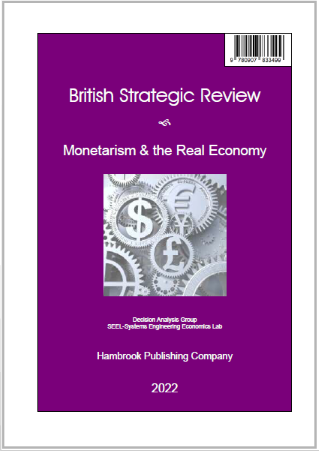   The British Strategic Review was launched as an annual publication in 2021 by the Strategic Decision Analysis Group of SEEL-The Systems Engineering Economics Lab. SEEL is a division of the George Boole Foundation Limited a non-profit company founded in 2010. The British Strategic Review was launched as an annual publication in 2021 by the Strategic Decision Analysis Group of SEEL-The Systems Engineering Economics Lab. SEEL is a division of the George Boole Foundation Limited a non-profit company founded in 2010.
The origins arose from seminars provided by SEEL to the Agence Presse Europeéenne Correspondents' Pool where the idea of a regular document on evolving theories and policies in the areas of constitution, politics and economics would be useful for both journalists as well as the general public. The basic idea raised was to produce a document with enough critical analysis to help sharpen up the role of journalists in holding decision makers to account.
This is not an easy task because it involves communicating both theoretical concepts and policy implications to a readership that might not have sufficient grounding in any of the topics covered to follow the contents of a more advanced text. This in fact, is not a matter of the topics being complex but rather relates to the need to avoid jargon and undefined terminology and to write, in general, in plain English. Clearly from time to time definitions of terms are required.
In terms of style and coverage, the work of Anthony Sampson in his "Anatomy of Britain", first published in 1962 and with its last edition "Who Runs this - The Anatomy of Britain in the 21st Century?" in 2004, was suggested as a model. Indeed, Anthony Sampson did an outstanding job in describing the power structures in the United Kingdom. He developed his analysis over several editions of this informative book.
However, strategic analysis is somewhat more of an exacting task in that to complete strategic analyses and then to make conclusions credible, there is a need to identify and describe the mechanisms whereby cause and effect take place, including the mechanisms used by those in power. Thus, beyond the description of group interests it is important to understand the way in which group interests shape political decisions and the degree to which these decisions represent rational expectations of constituents who consider themselves to live in a constitutional democracy.
Like Anthony Sampson, we will descend a learning curve on what is important and how to analyse and transit findings in a way that assists the readership gain an objective insight to both theory and policy.
Because it will take time to perfect this project's output we have created an ongoing "Notes" service which will provide subscribers with an ongoing update and elaboration of the content of the current Review to accommodate change as well as to provide a response to the feedback and questions received from subscribers.
|
|
|










